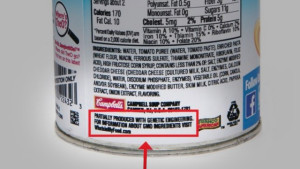 Campbell Soup Company made national headlines earlier this year when they became the first major food company in the world to label their own product’s GMOs independently. Stemming from Campbell’s belief in honest, transparent labeling, the company recognizes that “consumers appreciate what goes into our food,” and wants them to “feel good about the choices they make.”
Campbell Soup Company made national headlines earlier this year when they became the first major food company in the world to label their own product’s GMOs independently. Stemming from Campbell’s belief in honest, transparent labeling, the company recognizes that “consumers appreciate what goes into our food,” and wants them to “feel good about the choices they make.”
In an open letter to the public, Campbell’s CEO, Denise Morrison, eloquently recited the reasoning behind the company’s decision to freely label their own GMOs, as well as their support for federally regulated mandatory GMO labeling laws. “We have declared our intention to set the standard for transparency in the food industry,” Morrison wrote in Campbell Soup’s official press release.
Morrison elaborated on Campbell’s commitment to operating with a “consumer first” mindset, claiming that as the reason for experiencing such great success as a food manufacturer for the past 150 years. Campbell’s even went the extra mile, agreeing to remove all artificial colors and flavorings from their products, and provide detailed ingredient listings for all their products on WhatsInMyFood.com, including products containing GMOs.
Campbell’s withdraws support for any groups against mandatory federal GMO labeling
Campbell’s is no stranger to the non-GMO movement, as they’ve been actively involved in seeking a solution to the increasingly daunting dilemma since 2011. After witnessing a series of corporately funded Monsanto-laden deals corrupt the Senate’s treatment of the matter, Campbell’s has since decided to withdraw its support from all efforts led by groups opposing mandatory, federally regulated GMO labeling.
“Our decision was guided by our Purpose; rooted in our consumer-first mindset; and driven by our commitment to transparency – to be open and honest about our food,” read the closing segment of their January press release. “We now believe that proposing a mandatory national solution is necessary.”
 Recently, GMO labeling made headline news for the Senate’s proposed compromise GMO labeling bill drafted by Senate Agriculture Committee Chairman, Pat Roberts, and ranking member, Debbie Stabenow. The proposed bi-partisan bill directly opposes Vermont’s recently passed mandatory GMO labeling law, requiring food manufacturers to clearly, and legibly, label the GMO content of all products being sold in the state of Vermont.
Recently, GMO labeling made headline news for the Senate’s proposed compromise GMO labeling bill drafted by Senate Agriculture Committee Chairman, Pat Roberts, and ranking member, Debbie Stabenow. The proposed bi-partisan bill directly opposes Vermont’s recently passed mandatory GMO labeling law, requiring food manufacturers to clearly, and legibly, label the GMO content of all products being sold in the state of Vermont.
Lobbyist influence in Congress clouds the future of federally regulated GMO labeling
If passed, the Monsanto-engineered compromise bill will relieve food manufacturers from having to transparently label the genetically modified ingredients in their products, including those being sold in the state of Vermont, and will instead call for the placement of electronic QR codes to label product’s GMOs.
According to Errol Schweizer, a former Whole Foods executive, “Surveys consistently show 80-90 percent support for clear, concise labeling, exactly what thousands of products are already doing to comply with Vermont.”
The evidence accruing about what’s happening in Washington does not bode well for the future of food manufacturing and GMO labeling in the United States – which is even more reason to applaud Campbell’s for listening to the American public, and doing “the right thing.”
Campbell’s believes that, “Printing a clear and simple statement on the label is the best solution for consumers and for Campbell.” Even though the U.S. government seems to have no problem denying its citizens the right to know what’s in their food, at least someone recognizes that right. Thank you, Campbell’s.
Posted by Wes Maxwell for The Daily Mail, July 13, 2016.
FAIR USE NOTICE: This site contains copyrighted material the use of which has not always been specifically authorized by the copyright owner. We are making such material available in our efforts to advance understanding of environmental, political, human rights, economic, democracy, scientific, and social justice issues, etc. We believe this constitutes a ‘fair use’ of any such copyrighted material as provided for in section 107 of the US Copyright Law. In accordance with Title 17 U. S. C. Section 107, the material on this site is distributed without profit to those who have expressed a prior interest in receiving the included information for research and educational purposes. For more information go to: http://www.law.cornell.edu/uscode/17/107. shtml
